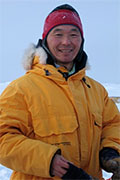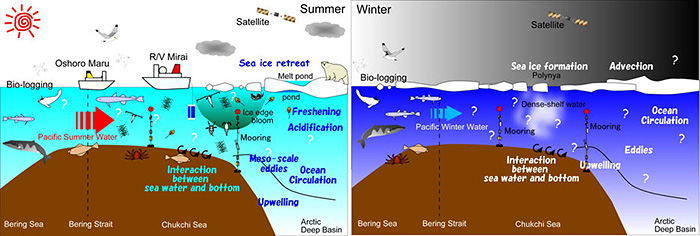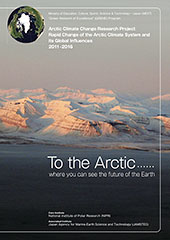Research Project (6)
Ecosystem studies on the Arctic Ocean declining sea ice
Principal Investigator: Takashi Kikuchi (Japan Agency for Marine-Earth Science and Technology)

Outline
The recent drastic decrease in Arctic sea ice may cause various changes in the Arctic climate and ecosystems. For example, improvement of the light environment due to the sea ice reduction may induce a favourable condition for the Arctic marine ecosystem, i.e., it may cause an increase in phytoplankton in the ice-free area. However, there is observational evidence which indicates that the increase in sea ice melt-water could inhibit the phytoplankton growth, because the nutrient supply from lower layer is suppressed by enhanced stratification due to the melt-water. The benthic organisms of the Arctic Ocean are also threatened by changes in marine environments. Currently, they feed on the ice-edge bloom of phytoplankton that sinks to the seafloor (Pelagic-Benthic type). However, warming of the Arctic Ocean may increase the population of zooplanktons and fishes, which will feed on phytoplankton at the ice-edge (Pelagic-Pelagic type). What type of marine ecosystem will the sea ice reduction bring about? The reduction of sea ice influences not only species that are inherent to the Arctic but also those from the Pacific Ocean. These changes further influence the lives of marine mammals and polar bears. Many questions are being asked on the changes in the Arctic marine ecosystem resulting from the sea ice reduction. For better understanding of these changes in Arctic climate and ecosystems, we will conduct multi-disciplinary studies examining not only biological but also physical and chemical aspects of the drastically changing Arctic environments.
The research project, "Ecosystem studies on the Arctic Ocean declining sea ice (ECOARCS)" was initiated. In this project, we will focus on the Chukchi Sea on the Pacific side of the Arctic Ocean, where various environmental changes have already accompanied the sea ice reduction. Hydrographic surveys by R/V Mirai (JAMSTEC), TS Oshoro Maru (Hokkaido University), and various ice-breakers under international collaboration will be carried out. Year-round mooring observations are useful for obtaining hydrographic, chemical and biological data even in winter time (under the sea ice). To clarify the feeding behaviour of higher trophic levels, we will also use the techniques of bio-logging and monitor large areas of the Arctic Ocean via satellite throughout the year. Furthermore, we are developing marine ecosystem models for the Arctic Ocean that can diagnose in detail the ongoing changes in the Arctic marine ecosystem and may predict its future.
By combining these products, we will contribute to the achievement of strategic research target ③b Evaluation of the effects of Arctic change on marine ecosystems and fisheries.
Schematic view of the marine ecosystem on the Pacific side of the Arctic Ocean and the observational plan of ECOARCS project.


